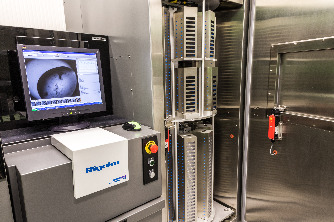View All Crystallisation at Instruct
The platform at the Biomolecular Interactions and Crystallography core facility (BIC) at CEITEC Instruct centre provides services for biophysical and structural characterisation of biomolecules, and studying (bio)molecular interactions. It is equipped with the instrumentation to set up crystallisation conditions of biomolecules and their complexes, basic characterisation of physical properties of the molecules (analytical ultracentrifugation, dynamic light scattering, CD spectroscopy, differential scanning calorimetry, differential scanning fluorimetry, size-exclusion chromatography), and to study thermodynamics and/or kinetics of interactions (isothermal titration calorimetry, surface plasmon resonance, bio-layer interferometry, microscale thermophoresis, CD spectroscopy, analytical ultracentrifugation). The facility is accessible each working day upon previous agreement.
More information can be found on the Biomolecular Interactions and Crystallography core facility webpage.
Biomacromolecular Crystallization can be used for (mainly together with X-ray diffraction): Determination of 3D structure – no principal size limit is applied (both NaCl and ribosome were crystallized and their structure solved). Identification of conserved and flexible regions. Analysis of structural changes caused by mutations. Identification of ligand interaction, architecture and number of binding sites. Determination of oligomeric state of the protein. Protein identification and purification (not commonly used).
Set-up of crystallization screens (drop volume 200-300 nl) using commercial kits (including kits for membrane proteins, protein complexes and nucleic acids). Vapor diffusion sitting drop crystallization method. More information about screen set-up is available on the CEITEC website.
Plate storage and inspection: Set-up of crystallisation screens (drop volume 200-300nl) using commercial kits (including kits for membrane proteins, protein complexes and nucleic acids). Vapor diffusion sitting drop crystallization method. Storage of the screening plates for 3 months at a constant temperature 4°C or 20°C, regular automatic inspection with online access to the images. UV imaging to distinguish a protein from a salt. Storage of the screening plates for extended period of time (6 months) at a constant temperature 4°C or 20°C with a possibility of a demanded extra inspection. More information about standard crystallisation screen set-up and plate storage inspection is available on the CEITEC website.
Setting-up multidimensional gradients for optimisation (from up to 5 different solutions). Set-up of optimisation screens, hanging drop and sitting drop crystallisation method, crystallisation under oil, microseeding. More information about customised crystallisation can be found on the CEITEC website.
Plate storage and inspection: Setting-up multidimensional gradients for optimisation (from up to 5 different solutions). Set-up of optimisation screens, hanging drop and sitting drop crystallisation method, crystallisation under oil, microseeding. Storage of the screening plates for 3 months at a constant temperature 4°C or 20°C, regular automatic inspection with online access to the images. UV imaging to distinguish a protein from a salt. Storage of the screening plates for extended period of time (6 months) at a constant temperature 4°C or 20°C with a possibility of a demanded extra inspection. More information about customised crystallisation plate storage and inspection can be found on the CEITEC website.
Storage of the screening plates for 3 months at a constant temperature 4°C or 20°C, regular automatic inspection with online access to the images. UV imaging to distinguish a protein from a salt. Storage of the screening plates for extended period of time (6 months) at a constant temperature 4°C or 20°C with a possibility of a demanded extra inspection. More information about customised crystallisation plate storage and inspection can be found on the CEITEC website. More information about plate storage can be found here.
Optimisation of protein crystal production in large scale (manual setting), Membrane protein crystallisation techniques, Crystallisation by dialysis or using capillaries. The service price is calculated individually. Contact the responsible person for details. More info here.
More information about crystallisation equipment and crystallisation screens can be found on the CEITEC website here.


